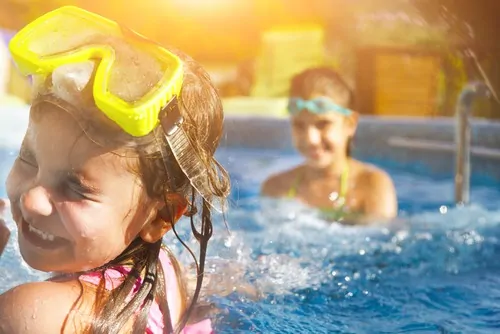
Swimming is a popular summertime activity, and it’s good for you too! It’s a great form of cardiovascular exercise, it’s super fun for kids, and it’s a sweet way to cool off on those hot days. But the team at our Woodlands pediatric dental office knows that there could be some harm lurking in your pool water that you probably don’t know about.
Many pools use chlorine to keep pool water free of dangerous bacteria that could be harmful to humans. But this chlorine may also put another part of the body at risk for damage — your teeth.
Research dating back to the 1980’s studied the negative effects of chlorine on oral health, particularly tooth enamel. Part of what chlorine does is level out the pH balance of pool water, so it’s safe for families. For most situations, pool water should have a pH between 7.2 and 7.8. But when this drops below this ideal range, the water actually becomes acidic. If this happens and you or your kids spend a lot of time in the pool, or a lot of water gets into your mouth, the acid can wear away tooth enamel and even cause tooth discoloration.
Tooth enamel is the super-strong protective layer of our teeth. It helps keep dangerous plaque and bacteria from eating away at the teeth and causing cavities. If tooth enamel erodes, whether it’s from an improperly chlorinated pool, drinking too many acidic drinks like lemonade, or brushing too hard, teeth are at increased risk for decay, wearing down, and sensitivity.
While anyone’s teeth can suffer from enamel erosion, the cases in which the erosion is caused by chlorine is often found in competitive swimmers or those who spend a lot of time in pools. The truth is if you and your family only swim occasionally you’re probably not at risk.
Two of the first signs that a pool’s pH is too low are irritated skin or burning eyes while swimming. Over time, you may start to notice brown spots on the teeth (known as swimmer’s calculus) or experience increased tooth sensitivity. If you notice any of these changes, visit your pediatric dentist in The Woodlands as soon as you can.
Besides proper brushing and flossing, there are steps you can take to help protect your child’s enamel against erosion — and no, they don’t need to give up swimming. Just make sure you test the water for proper pH levels regularly and try to encourage them to keep pool water out of their mouths as much as possible. Of course, it’s also important to see their Woodlands pediatric dentist at least every six months for regular checkups and professional cleanings.
Welcoming patients from Spring, The Woodlands, and surrounding areas.